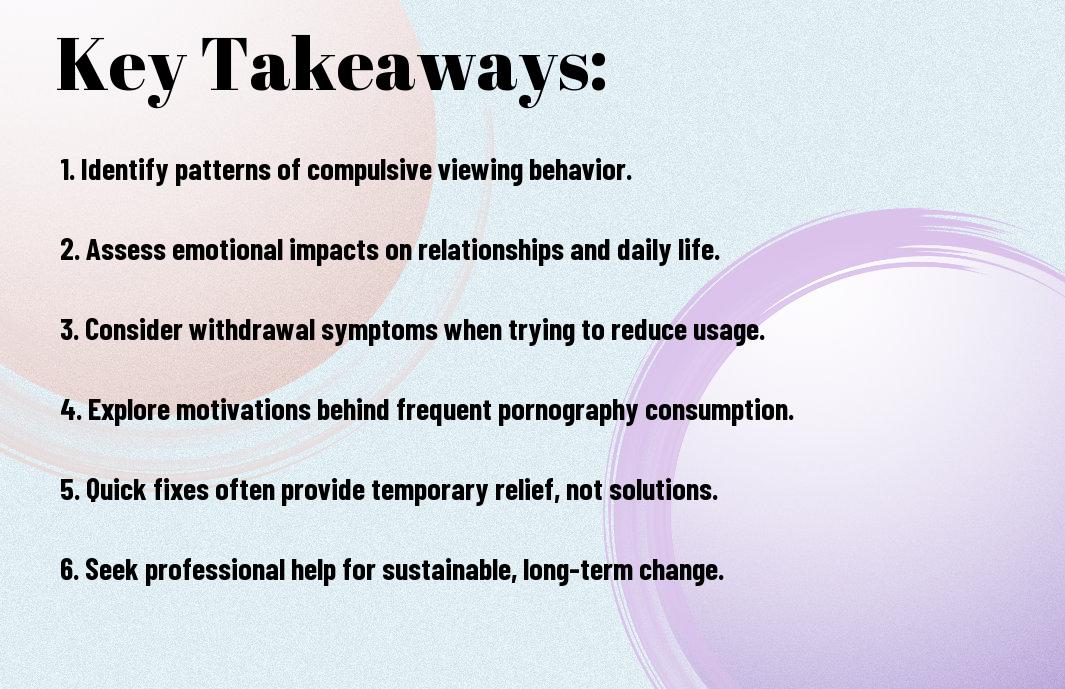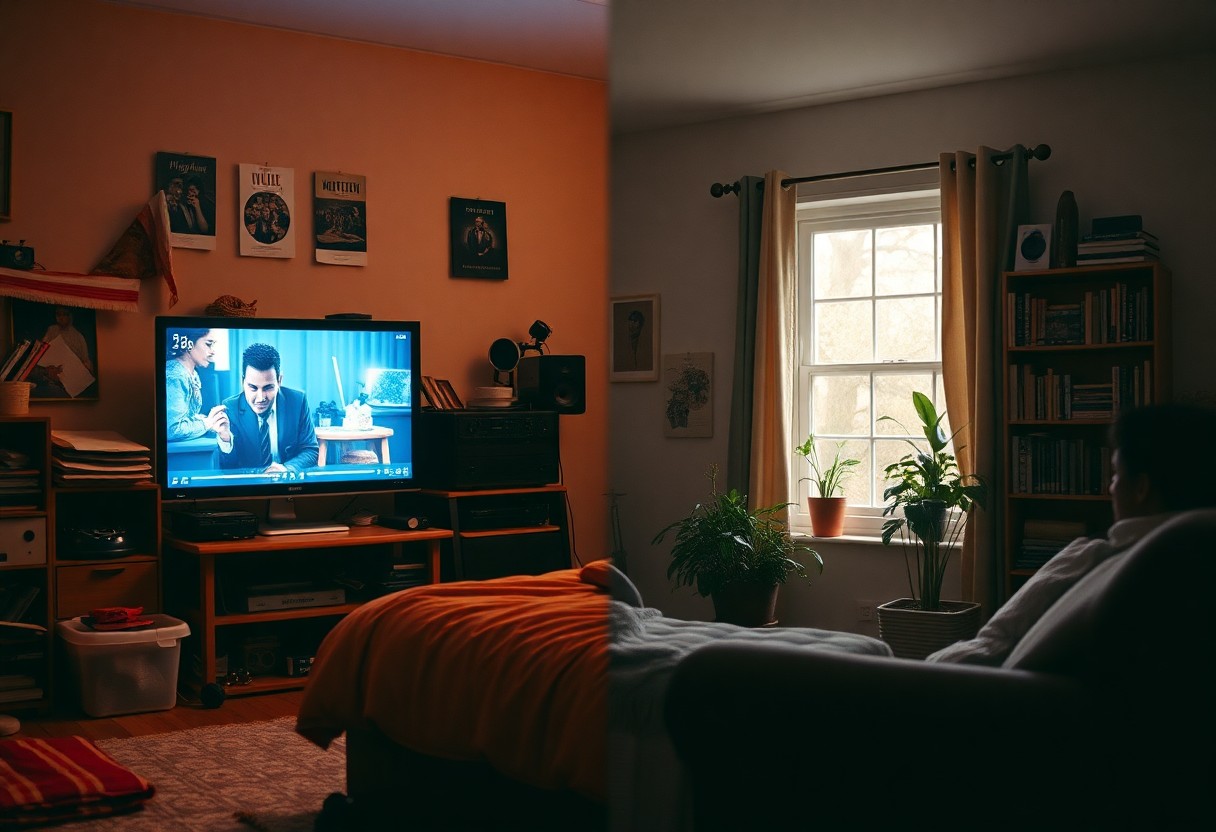Many individuals struggle with the impact of porn in their lives, often questioning whether it has become an addiction. Understanding whether your behavior around pornography is healthy or harmful is the first step towards regaining control. In this post, you’ll learn to recognize the signs of porn addiction, explore quick fixes that might provide immediate relief, and discover long-term strategies that promote real change in your relationship with adult content.

Key Takeaways:
- Recognize the signs of porn addiction, such as compulsive viewing and neglecting responsibilities or relationships.
- Understand the difference between seeking quick fixes, like temporary abstinence, and pursuing long-term solutions that address underlying issues.
- Consider professional help if attempts to reduce porn consumption are unsuccessful, as therapy can provide tailored strategies and support.
- Explore healthy coping mechanisms and satisfying substitutes for pornography that can redirect attention and energy.
- Keep track of patterns in your viewing habits to identify triggers and the emotional states that lead to porn use.
- Engage in open conversations about porn, as discussing it can reduce shame and help establish accountability.
- Maintain a balanced life through hobbies, social connections, and self-care practices to reduce reliance on pornography for gratification.

Understanding Porn Addiction
As you navigate the complexities of modern sexuality, understanding porn addiction becomes imperative for your emotional and mental well-being. This form of addiction can significantly impact various aspects of your life, including relationships, mental health, and daily functioning. Recognizing the signs and addressing them promptly will help you reclaim control over your habits.
Defining Porn Addiction
Around 5-10% of adults report signs of porn addiction, which can manifest as an overwhelming urge to view pornographic material, often to the detriment of your relationships and daily responsibilities. This behavior typically escalates over time, making it harder to break free without support.
Signs and Symptoms
Porn addiction can manifest through various signs, such as losing interest in real-life intimacy, using porn to cope with stress or emotions, or feeling compelled to watch, even when you don’t want to. You may find yourself consuming more explicit content over time or experiencing shame and guilt after viewing. Recognizing these symptoms is the first step toward addressing the issue.
At times, you might notice that your relationship with porn has shifted from casual enjoyment to compulsive behavior, impacting your mood, relationships, and even your productivity. You may find it increasingly hard to focus on work or maintain healthy relationships due to your preoccupation with viewing porn. Additionally, you might struggle with feelings of isolation or depression, reinforcing the cycle of addiction. Addressing these signs is vital for restoring balance in your life.

Assessing Your Relationship with Porn
It’s imperative to take a step back and evaluate your connection to pornography. Understanding the nuances of your consumption patterns and their consequences can help you identify whether what you experience leans towards addiction. By honestly assessing your habits, triggers, and feelings associated with porn, you can gain valuable insights into how it affects your life and relationships.
Frequency and Duration
Duration and frequency of your porn use can be telling indicators of an addiction. Consider how often you find yourself engaging with pornographic content and for how long each time. If this behavior is persistent and escalating, it may suggest that your relationship with porn may be moving beyond casual use.
Impact on Daily Life
One significant factor to consider is how your porn consumption influences your daily life. Are you neglecting responsibilities, social interactions, or personal relationships due to your habit? If you find your engagement with porn interferes with work or personal tasks, this could be a sign that your relationship with it is unhealthy.
Further, if you notice that your mood, focus, or energy levels fluctuate in relation to your porn use, it may indicate a deeper reliance on this stimulus. You might find yourself turning to porn as a way to cope with stress or boredom, affecting your emotional well-being and daily functionality. Recognizing these patterns can be a critical step toward making informed changes to improve your lifestyle.
Quick Fixes for Porn Addiction
Not all solutions are created equal when it comes to overcoming porn addiction. Quick fixes may provide temporary relief but often fail to address the underlying issues. Relying solely on short-term strategies can lead to a cycle of guilt and shame, hindering your journey to recovery.
Short-Term Strategies
With a focus on immediate relief, short-term strategies can help you temporarily manage your cravings. This might include engaging in physical activities, practicing mindfulness, or finding alternative hobbies to occupy your mind. These can offer distraction and reduce the urge to engage with porn, but they won’t resolve the root causes of your addiction.
Tools and Resources
By leveraging various tools and resources, you can create a supportive framework for overcoming porn addiction. This includes online forums, apps designed for accountability, and literature on the topic. Utilizing these resources can enhance your understanding and effectively aid in the recovery process.
A combination of structured programs and supportive communities can significantly assist you on this journey. Consider utilizing apps that track your habits, engage with online support groups, or read self-help books focused on overcoming addiction. These tools provide not just immediate support but also help you build healthier habits over time.
Long-Term Solutions
All individuals facing a struggle with porn addiction must recognize that quick fixes are not sufficient for lasting change. Engaging in therapy and understanding the roots of your addiction can help you effectively address the underlying issues. Educating yourself about addiction through resources like Addiction: What It Is, Causes, Symptoms, Types & Treatment can provide insight and assistance on your journey to recovery.
Therapy Options
LongTerm therapy options such as cognitive-behavioral therapy (CBT) or support groups can be highly effective in treating porn addiction. These therapies enable you to identify unhealthy thought patterns and develop healthier coping strategies, providing a strong foundation for your recovery.
Building Healthy Habits
For sustainable recovery, building healthy habits is necessary. This may involve setting boundaries with technology, finding new hobbies, and cultivating a supportive environment. Replace negative behaviors with positive activities that promote your overall well-being.
Another key aspect of building healthy habits includes creating a structured daily routine that prioritizes self-care and mindfulness. Engaging in physical exercise, practicing meditation, and fostering meaningful social connections can greatly enhance your ability to cope with urges while reinforcing your commitment to living a healthier lifestyle.
The Role of Support Systems
Many people struggling with porn addiction find that building a support system is necessary for their journey toward recovery. Friends, family members, or professionals can provide the encouragement and motivation needed to overcome challenges. Having a solid support network can foster accountability and help you feel less isolated in your experiences. It’s important to seek out relationships that uplift you and push you toward your goals.
Seeking Help from Others
Support from others can be a game-changer in overcoming porn addiction. Whether you turn to friends, family, or mental health professionals, having someone to talk to about your struggles can help alleviate feelings of shame and isolation. Sharing your experiences can provide insights, encouragement, and different perspectives, making it easier to stay committed to your recovery journey.
Community and Online Resources
Along with personal relationships, community and online resources play a significant role in your recovery efforts. Joining support groups, both in-person and online, can connect you with individuals who share similar experiences. These platforms often provide useful tools, expert advice, and various methodologies tailored for your personal journey. Engaging with community resources helps reinforce your commitment to change and gives you access to a wealth of information.
With the rise of digital connectivity, numerous online platforms offer resources specifically aimed at porn addiction recovery. Websites, forums, and social media groups create spaces where you can share your thoughts and experiences without judgment. These communities can provide valuable advice, share recovery strategies, and give you the chance to connect with individuals who are navigating similar challenges. Utilizing these online resources not only bolsters your support system but also empowers you to take actionable steps toward long-term healing.

Preventing Relapse
Keep in mind that preventing relapse requires ongoing commitment and self-awareness. Developing a robust support system and engaging in healthy activities can significantly reduce your chances of falling back into old habits. Identify triggers and create a strategy to manage situations that may lead to a relapse, reinforcing your resolve to maintain a healthier lifestyle.
Techniques for Maintaining Progress
Relapse is a common struggle for many; however, you can effectively manage your progress by implementing specific techniques. Establish clear goals, track your achievements, and employ coping strategies, such as journaling or reaching out to a trusted person when you face temptation. Regularly reviewing your motivations can also strengthen your commitment to change.
Mindfulness and Self-Reflection
Preventing a relapse involves incorporating mindfulness and self-reflection into your daily routine. By cultivating these practices, you can develop a greater awareness of your thoughts and emotions that may lead to cravings, allowing you to respond more consciously rather than react impulsively.
Also, practicing mindfulness helps you stay grounded in the present moment, reducing anxiety and stress that could trigger unhealthy habits. Engaging in self-reflection encourages you to examine your motivations and the feelings behind your urges, enabling you to identify patterns and address them constructively. Regularly setting aside time for these practices can foster resilience and reinforce your commitment to overcoming porn addiction.
Conclusion
Summing up, recognizing whether you have a porn addiction involves self-reflection on your habits and their impact on your life. Quick fixes may provide temporary relief, but they often do not address underlying issues. For a long-term solution, consider seeking professional help, developing healthier coping mechanisms, and assessing your relationship with pornography. By taking a proactive approach, you can regain control and foster a more balanced perspective on sexual content.
FAQ
Q: What are the signs that I might have a porn addiction?
A: There are several indicators that may suggest a porn addiction. These can include spending excessive time watching porn, neglecting responsibilities or relationships due to porn use, feeling a compulsion to watch porn, and feeling distressed or anxious when unable to access it. If you find yourself preoccupied with porn to the extent that it interferes with your daily life, it may be worthwhile to evaluate your habits.
Q: How is a quick fix different from a long-term cure for porn addiction?
A: A quick fix often involves temporary solutions such as avoiding triggers, using porn blockers, or short-term behavioral modifications. In contrast, a long-term cure requires deeper introspection, addressing underlying emotional issues, and developing healthier coping mechanisms. Long-term strategies often involve therapy, support groups, and lifestyle changes that foster sustainable recovery.
Q: Can I overcome porn addiction on my own or do I need professional help?
A: While some individuals may find success in self-help strategies, many benefit from professional guidance. A therapist who specializes in addiction can provide tools and strategies tailored to your situation. Support groups can also offer community understanding and shared experiences, which can be powerful in the healing process.
Q: What role do triggers play in porn addiction, and how can I manage them?
A: Triggers are stimuli that evoke the desire to consume porn, whether they be emotional (stress, loneliness) or environmental (specific websites, certain locations). Managing triggers involves identifying them and developing coping strategies, which can include changing your routines, avoiding certain situations, or practicing mindfulness techniques to handle cravings effectively.
Q: How can I distinguish between casual use and addiction?
A: Casual use of porn is typically defined by voluntary, limited engagement without significant negative consequences. Addiction, on the other hand, manifests through compulsive behavior that disrupts personal, professional, or social aspects of life. If porn use is causing distress or impacts your relationships, it is more likely to be an indication of addiction.
Q: Can porn addiction affect my relationships?
A: Yes, porn addiction can significantly impact personal relationships. It may lead to reduced intimacy with partners, unrealistic expectations about sex, and a decrease in communication. Many individuals find that their emotional connections suffer as their focus shifts from real-life interactions to virtual experiences. Addressing the addiction can help restore healthier dynamics in relationships.
Q: What long-term strategies can I adopt to overcome porn addiction?
A: Long-term strategies can include seeking therapy or counseling focused on addiction, engaging in regular physical activity, practicing mindfulness or meditation, developing new hobbies, and building a supportive network of friends or group support. Setting achievable goals and regularly reassessing your progress is also important in maintaining a successful recovery journey.
